Choosing the Right Cat Food for Loose Stool Relief
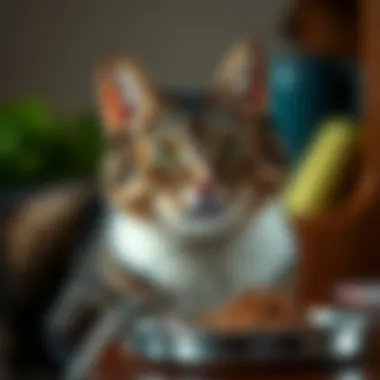
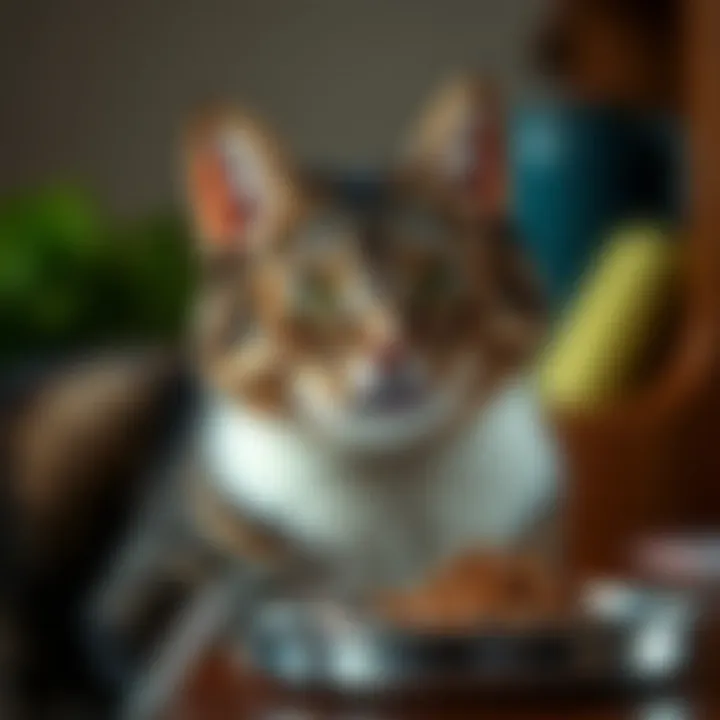
Intro
When it comes to cats, maintaining their health and well-being is paramount for any responsible pet owner. One of the issues that can lead to serious concerns is loose stool. Not only can this be uncomfortable for our feline friends, it can indicate underlying health problems that need attention. Thus, selecting the right cat food can play a critical role in addressing this delicate issue. This guide aims to provide cat owners with comprehensive insights into the dietary choices that can help manage loose stool effectively.
Ensuring that your cat receives proper nutrition is not just about quantity but quality. When the litter box resembles a crime scene, it's a signal that something's off in the digestive department. By nawing on the right food, you’re not merely satisfying a hunger but fostering a more robust gastrointestinal system. Let’s delve deeper into how to choose the right cat food that can combat the all-too-frequent issue of loose stools, exploring the essential ingredients and nutritional components that make a difference.
Understanding Loose Stool in Cats
Understanding the nuances of loose stool in cats is a cornerstone of maintaining their overall well-being. It’s not merely about keeping your feline friend comfortable—this aspect of their health can be an indicator of underlying issues that need attention. For cat owners, recognizing what loose stool means and how it manifests can lead to timely interventions and informed decisions regarding diet and dietary choices.
Defining Loose Stool
Loose stool in cats, often referred to as diarrhea, is defined as softer or more watery stools than normal. Generally, a healthy cat's stool should be well-formed, firm, and easy to clean up post-use. When a cat experiences loose stools, it is often a response to irritation in the gastrointestinal tract, suggesting that something is amiss in their digestive process. The texture and frequency of the stool can vary, sometimes accompanied by additional symptoms like lethargy or vomiting, all of which warrant a closer look at their diet and health status.
Common Causes of Loose Stool
Understanding what can cause loose stool puts cat owners in a better position to tackle the issue. It can be attributed to several factors:
- Dietary Changes: Sudden shifts in their food, whether it's a new brand or formula, can upset their stomachs.
- Food Intolerances or Allergies: Some cats may react negatively to certain ingredients, such as dairy or specific proteins.
- Parasites: Intestinal parasites like worms often lead to loose stools—these can be sneaky and hard to detect without veterinary help.
- Infections: Bacterial or viral infections can also cause gastrointestinal disturbances.
- Stress or Anxiety: Emotional well-being is vital; significant changes in their environment can result in loose stool as a physiological response.
These cause factors can overlap, creating a complex scenario that demands attentive observation from cat owners.
When to Consult a Veterinarian
Not every episode of loose stool requires a trip to the vet, but knowing when to seek help is crucial. If your cat's loose stool persists for more than a day or two, or if you observe any of these symptoms, it's time to act:
- Blood in Stool: This is a serious concern and should prompt immediate veterinary attention.
- Vomiting: If your cat is regularly vomiting alongside diarrhea, it can indicate a more severe issue at play.
- Lethargy: A reduction in energy or overall alertness can signal dehydration or an underlying illness.
- Weight Loss: If you notice your cat losing weight rapidly, professional guidance is necessary for their health.
A proactive approach, including a visit to the veterinarian, can help to ensure that even minor gastrointestinal issues do not escalate into severe health problems.
Seeking early veterinary advice can make all the difference in addressing your cat's digestive issues effectively.
For more information on pet health, consider checking out resources like Wikipedia or joining discussions on Reddit.
The Role of Diet in Digestive Health
Choosing the right cat food is, without a doubt, pivotal in maintaining a feline's digestive health. What goes into a cat's bowl directly influences not just the taste they experience, but also their overall well-being. Identifying the nuances of how diet impacts digestion can help pet owners make smarter decisions when it comes to managing their cat’s loose stool issues.
It’s essential to recognize that a cat's dietary intake can either soothe or aggravate their gastrointestinal tract. Foods high in low-quality ingredients can lead to inflammation and digestion hurdles, while those specifically formulated for digestive ease can aid in restoring balance. This balance is especially important if your cat has a sensitive tummy.
How Nutrition Affects the Digestive System
At the heart of a cat’s digestion lies the complexity of their nutritional needs. Unlike humans, felines are obligate carnivores, meaning their bodies are designed to get most of their nutrients from meat. Proteins are pivotal, but carbohydrates and fats also play significant roles in the digestion process. The types of proteins, specifically their digestibility, can make a world of difference.
When selecting food, look for sources of animal protein that are highly digestible, such as chicken, turkey, or fish. Conversely, vague terms like 'meat meal' or 'by-products' do little to assure quality. Digestive enzymes, such as those found in natural food sources like fruits and vegetables, can enhance nutrient absorption. Adding these valuable ingredients makes it easier for cats to metabolize their meals, reducing the chance of improper digestion, which often leads to loose stools.
Understanding Fiber's Importance
Fiber isn't just a buzzword in the world of cat food; it serves a real purpose in regulating digestion. It can help keep things moving in the right direction and can even aid in retaining moisture in stool, helping it form better.
Different kinds of fiber play varied roles:
- Soluble fiber, such as that from pumpkin or oats, can absorb water and help thicken stool.
- Insoluble fiber, from ingredients like brown rice, adds bulk to the stool and aids in faster passage through the intestines.
However, too much fiber can cause digestive discomfort. It’s important to find that sweet spot tailored to your individual cat’s needs. This is another reason why it can be beneficial to consult with a vet when selecting a diet for cats with loose stools.

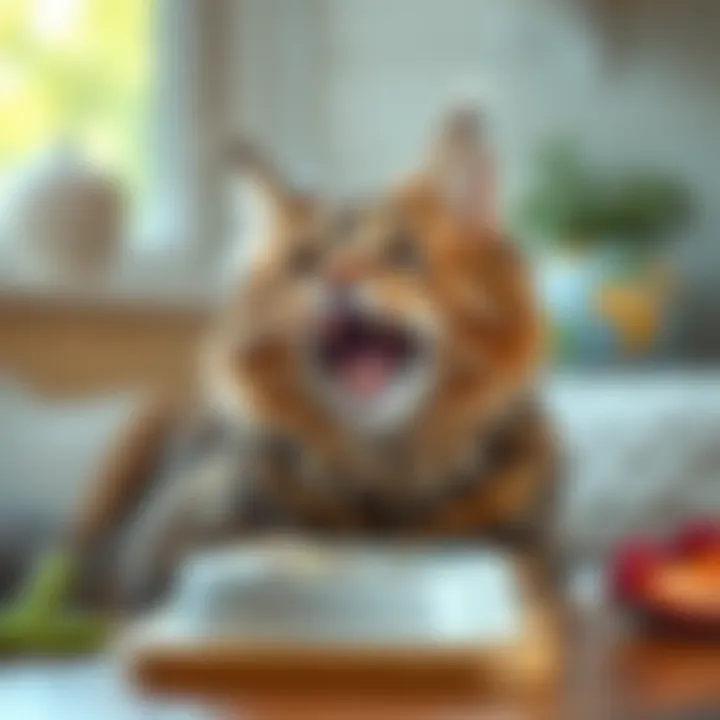
The Impact of Hydration
Hydration is a critical, yet often overlooked component of digestive health. Many cat owners might only focus on food, but the amount of water your cat consumes plays an equally important role. Dehydration can exacerbate digestive issues, creating a perfect storm for loose stool.
Wet food diets often prove advantageous for hydration, as these types of food can provide a substantial moisture component. For cats that are reluctant to drink water from a bowl, consider offering wet food alongside fresh water daily. This dual approach can help maintain optimal hydration and support overall digestive health.
"A well-hydrated cat is a happy cat, and a happy cat tends to have a healthier digestive system."
Choosing the Right Cat Food
Selecting the right cat food is not just about filling up a bowl; it can have significant effects on your feline friend's digestive health, especially if they're experiencing loose stools. A well-informed choice can mean the difference between a happy, healthy cat and one that suffers from ongoing discomfort. It’s essential to focus on specific elements like ingredients, formulations, and the overall nutritional balance of the food. Let's take a closer look at how to navigate these choices.
Key Ingredients to Look For
Choosing cat food with the right ingredients is like putting the best fuel into a high-performance sports car. It makes all the difference. Cats are obligate carnivores, meaning they thrive on a protein-rich diet. Here are some key ingredients to prioritize:
- High-Quality Protein Sources: Look for named meat sources such as chicken, turkey, or fish listed as the first ingredient. This assures that the food has adequate protein to support muscle health and energy levels.
- Digestible Carbohydrates: If the food contains carbohydrates, opt for easily digestible sources like sweet potatoes or peas. These can aid digestion without overwhelming the system.
- Prebiotic and Probiotic Additives: These can help maintain a healthy gut flora, which plays a pivotal role in digestion. Ingredients like chicory root extract can be particularly beneficial.
- Omega Fatty Acids: Ingredients such as salmon oil or flaxseed provide omega-3 and omega-6 fatty acids. These contribute to a healthy coat and skin and can reduce inflammation in the digestive system.
"The ingredients in a cat's diet are the building blocks of their health and vitality; careful selection leads to a happier, more energetic cat.”
Types of Cat Food Formulations
When it comes to cat food, the type of formulation also plays a crucial role in managing digestive health. Each type has its own set of pros and cons. Here’s a breakdown:
- Dry Food (Kibble): While convenient, dry food may not be the best option for cats with digestive issues as it often has high carbohydrate levels. If you go this route, ensure it has balanced nutrients and sufficient protein.
- Wet Food (Canned): This option is often more palatable for cats and contains higher moisture, which can help with hydration. It typically has less processed ingredients, making it easier on the digestive system.
- Raw Diets: Some pet owners opt for raw feeding; however, it's a commitment that requires careful planning to ensure nutritional completeness and safety from pathogens, and it may not suit every cat.
- Freeze-Dried Options: These can combine the benefits of raw feeding with convenience but check if they provide the necessary enzymes and probiotics that raw food offers.
Understanding Grain-Free Options
Grain-free diets have gained popularity over the last decade, often due to the assumption that grains contribute to digestive issues. However, the reality is a bit more nuanced. Here are key points to consider:
- Not Universally Better: Grain-free does not automatically mean better for your cat’s digestion. Some cats may actually benefit from certain grains like brown rice or oatmeal, which can be a good source of fiber.
- Risk of High Carbohydrates: Many grain-free formulas substitute grains with high levels of other carbohydrates, like potatoes or peas. This can be troublesome for cats with sensitive stomachs, leading to further digestive issues.
- Potential Health Concerns: Some studies have pointed towards a link between certain grain-free diets and heart disease in dogs, though research on cats remains limited. It's wise to discuss with a vet before switching.
Choosing the right food is crucial for any cat owner, especially if digestion is a concern. Evaluation of ingredient quality, formulation type, and understanding of dietary needs will put you on a solid path toward improving your cat's health.
Specialized Diets for Loose Stool
When it comes to ensuring your cat maintains optimal digestive health, selecting the right food can be a game changer, particularly if your furry friend tends to have loose stool. Specialized diets are not just a trend; they can offer significant benefits by targeting gastrointestinal concerns effectively.
Veterinary Prescription Diets
Veterinary prescription diets serve as a crucial component in managing feline loose stools. These diets are created with specific formulations that address the underlying issues related to digestion. Usually involving unique blends of fiber, protein, and carbohydrates, they help support your cat’s gut flora, making their digestive system run like a well-oiled machine.
These diets often contain higher amounts of soluble fiber, which helps absorb excess water in the intestines, leading to firmer stools. Ingredients like chicken meal or hydrolyzed proteins are common, ensuring your cat gets essential nutrients without triggering further gastrointestinal discomfort.
Important Note: Always consult your veterinarian before making any changes to your cat’s diet, especially when considering a prescription diet.
Probiotics and Their Benefits
Many cat owners might overlook the role of probiotics when addressing loose stool issues. Probiotics, the beneficial bacteria, can significantly aid in restoring balance to your cat’s gut microbiome. Including probiotics in your cat’s diet can enhance digestion and boost immunity—all while reducing stool inconsistencies.
Common sources of probiotics in cat food include fermented ingredients or specific bacterial strains. Brands like Hill’s Science Diet and Royal Canin often incorporate these elements into their formulations. Consistent use of probiotics can result in notable improvements in your cat's stool quality and overall health.
Commercial Options with Science-Backed Formulas
In addition to prescription diets and probiotics, various commercial cat food brands have taken to formulating their products with scientific backing to target digestive health. These foods often boast high-quality proteins and a balance of fiber sources designed to support regular bowel movements. Brands such as Purina Pro Plan and Orijen have developed formulas that contain digestible ingredients formulated to minimize the risk of gastrointestinal upset.
When choosing a commercial option, look for labels that clearly state their formulation is specifically for digestive health, often including blended fibers or specially selected protein sources. Importantly, ensure they are free from fillers or preservatives that could contribute to loose stools.
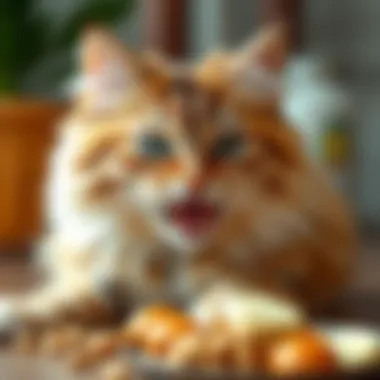
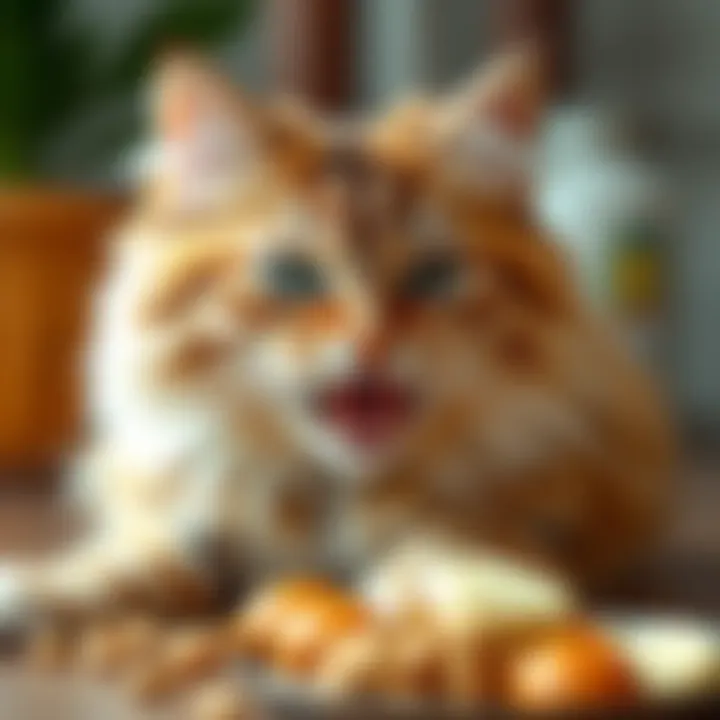
Remember to transition gradually to these specialized diets. Sudden changes can lead to additional digestive issues—making a slow integration vital to success.
Transitioning to New Cat Food
Transitioning to new cat food is a significant part of managing your cat's digestive health, especially when dealing with the issue of loose stools. The wrong approach can throw a cat's gut flora out of balance or create additional discomfort. It's not just about switching brands; it's about understanding your cat's unique needs and gradually introducing changes to their diet. A gentle transition can help your feline adjust to new ingredients and formulations, reducing the risk of gastrointestinal upset.
For any cat owner, knowing how to effectively change your pet's food can be quite the challenge. A methodical transition not only paves the way for better digestion but can also enhance your kitty's overall well-being. Therefore, let’s delve deeper into effective strategies.
Steps for a Gradual Transition
Changing your cat's food suddenly is like tossing them into the deep end of a pool without teaching them to swim. Instead, follow these steps for a smooth transition:
- Begin with a Blend: Start by mixing a small amount of the new food into your cat's current diet. About 25% new food with 75% old food is a good place to start.
- Observe the Response: Over the next few days, monitor your cat's reaction. Are they eating well? Any changes in stool consistency? Keep an eye on their behavior, appetite, and energy levels.
- Gradually Increase New Food: If everything seems fine, gradually increase the ratio of new food to old food every few days. Shift to half and half after about three to five days, then to 75% new food and 25% old food.
- Full Switch: After about 10 to 14 days, most cats will be ready for the complete switch if there haven't been any adverse reactions.
Remember, patience is key. Some cats may take a little longer to adjust. If loose stools persist past the transition period, it may be time to consult a veterinarian.
Monitoring Your Cat's Response
During this transitional period, closely monitoring your cat's response is crucial. This involves keeping track of:
- Bowel Movements: Look at the frequency and consistency of stools. Loose stools can be a sign of dietary intolerance or ongoing digestive issues.
- Eating Habits: Is your cat showing a preference for the new food? Listen for any sounds of dissatisfaction during mealtime. It’s also wise to note if they leave food uneaten or seem less enthusiastic.
- Behavior Changes: Any changes in their activity level can be telling. A cat that suddenly becomes lethargic may require a bit of further investigation.
If you notice ancient habits returning, perhaps a few days into the transition—immediately step back the ratio to what they were eating comfortably.
Identifying Potential Allergies
As vital as it is to pick the right food for loose stool, being aware of potential allergies or sensitivities is equally important. Cats can be sneaky little creatures, often hiding their discomfort. Here are some tips to spot possible allergies:
- Skin Reactions: Watch for excessive itching or redness on the skin. These might indicate a food allergy.
- Digestive Disturbances: Signs like vomiting or hairballs, in addition to diarrhea or loose stools, may point towards an allergic reaction to new ingredients.
- Behavioral Changes: Increased aggression or sudden withdrawal could indicate discomfort, potentially from an allergic reaction.
If you suspect your cat may have allergies, it’s best to revert to their previous diet and consult a veterinarian for advice before introducing a new food that might suit their needs better.
“All good things come to those who wait”—this holds especially true for our feline friends when it comes to their diets.
By taking a considered approach to transitioning to new food for your cat, you can set a course towards enhancing their digestive health, ultimately leading to happier snuggles and purrs.
Long-Term Management of Digestive Health
Managing your cat's digestive health is not just about choosing the right food. It's like steering a ship through uncharted waters; without a solid plan, you may drift without direction. Maintaining long-term digestive health helps prevent not only loose stools but can also avert more serious gastrointestinal issues down the line. The right cat food can transform a messy situation into a smoother sailing. Here are the primary aspects to consider in this ongoing journey.
Establishing a Routine
A regular feeding schedule is crucial for your cat’s digestive system to know what to expect and when. Think of it like setting your wristwatch; it needs to be precise to keep everything in sync. When you feed at the same times each day, it helps stabilize their digestive processes. A sudden change in feeding times can lead to stress and even digestive upset.
- Aim for two to three small meals per day rather than one large meal.
- Keep a consistent environment during mealtime—less stress can mean a calmer tummy.
- Always monitor your cat's food intake and bowel habits. The more aware you are, the better you can manage any fluctuations.
As an example, perhaps you have a busy lifestyle. Pre-measuring daily portions and using an automatic feeder can help you stick to this routine, ensuring that your cat doesn't miss a meal.
Regular Veterinary Check-Ups
Periodic visits to the vet are like having a compass while out at sea; they provide guidance and reassurance. Regular veterinary check-ups allow for early detection and management of any potential health issues before they escalate into something unmanageable. Often, loose stool may be more than just a dietary issue; it could hint at underlying health problems.
"Regular check-ups can save your pet from unnecessary discomfort and your peace of mind."
- Schedule annual veterinarian visits, or bi-annual for senior cats.
- Discuss your cat's diet especially if any changes occur—this dialogue can reveal vital connections between diet and digestive health.
- Ask for stool analysis if loose stools persist, which can provide insights into infections or parasites that may not be immediately obvious.
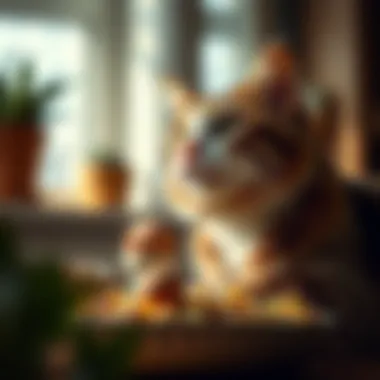
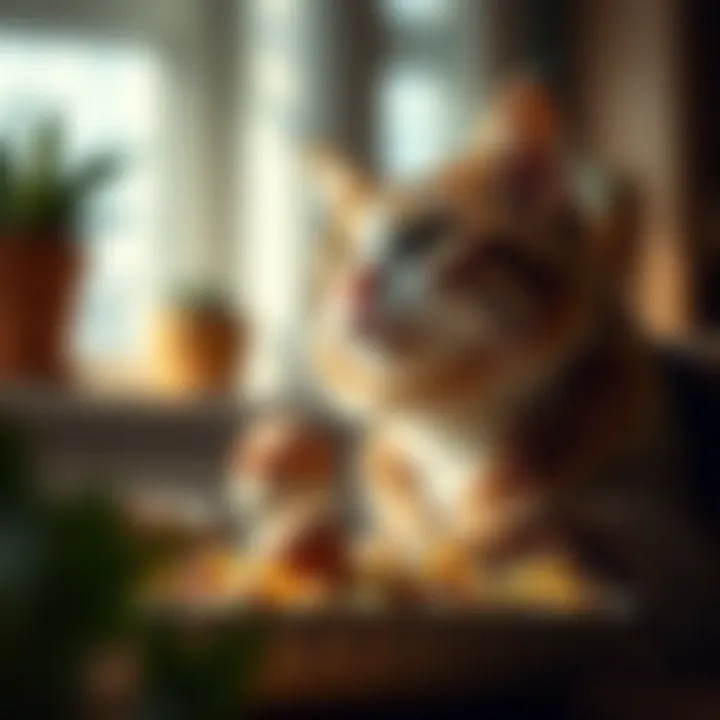
Incorporating Supplements and Natural Remedies
In some cases, supplements might be the cherry on top of a well-rounded diet. Just as you might reach for a multivitamin during cold season, incorporating appropriate supplements can fortify your cat’s digestive system. However, not all supplements are created equal, so a discerning approach is necessary.
- Probiotics can help restore balance in your cat’s gut flora. Look for options specifically formulated for felines.
- Dietary fiber supplements can also help create firmer stools, as they act like a sponge to absorb excess water in the gut.
- Natural remedies such as pumpkin puree can be beneficial. Just a spoonful can help manage a loose stool while providing fiber.
However, before diving into supplements, it's wise to consult your veterinarian. They can provide tailored recommendations that best suit your cat’s specific needs.
By focusing on these long-term strategies, you create a proactive management plan that prioritizes your cat's ongoing digestive health and well-being.
For more detailed information on cat health and nutrition, consider exploring resources from American Veterinary Medical Association or the Feline Nutrition Foundation. These platforms offer valuable insights that can help you further in this important journey.
Case Studies and Success Stories
Understanding real-life cases and insights shared by both cat owners and veterinarians can illuminate the path to effectively selecting cat food for addressing loose stool issues. These case studies are not just anecdotes; they provide valuable evidence on how specific diets have worked in practical situations. They help bridge the gap between theoretical knowledge and practical application, showcasing the impact of dietary choices on improving feline gastrointestinal health.
Real-Life Experiences of Cat Owners
When it comes to managing loose stool in cats, insights from fellow cat owners can prove to be as invaluable as guidance from professionals. For instance, Mia, a cat parent living in Ohio, struggled for months to find a suitable diet for her one-year-old Burmese cat, Oliver, who faced relentless bouts of diarrhea. After trying various store-bought brands with no success, Mia decided to consult an online forum dedicated to cat health.
She learned that switching to a high-protein, limited-ingredient diet – specifically designed for sensitive stomachs – made a significant difference. The ingredients list emphasized easily digestible proteins and minimal fillers. After a gradual introduction of the new food, Mia noted a marked improvement in Oliver's stool consistency within just a couple of weeks. This was a game changer in her efforts to restore Oliver's gut health.
Cat owners like Mia often emphasize how important it is to document their cat's reactions to different foods. Keeping a food diary helps to track both positive and negative responses, guiding future dietary decisions.
"The right cat food was not just about personal preference; it was about understanding what Oliver's body could handle" – Mia, a proud cat owner.
Veterinary Insights on Effective Diets
Veterinarians not only study the principles of nutrition but also witness countless cases where dietary change has improved the quality of life for cats. Dr. William, a feline specialist, stresses the role of fiber in a cat's diet when addressing loose stools. He often explains to pet owners that the right balance of soluble and insoluble fiber is crucial for maintaining a healthy digestive system.
Dr. William’s clinical experience correlates with various case studies showing that diets rich in soluble fiber like beet pulp can help firm up stool consistency by absorbing excess water. In one of his cases involving a ginger tabby named Leo, a diet transition to a specially formulated fiber-rich cat food resulted in noticeable improvements in Leo’s stool quality within a week.
Veterinarians like Dr. William advocate for the use of prescription diets in specific cases, aligning their recommendations based on the unique needs of each cat. They also emphasize the importance of probiotics, which can aid in restoring a healthy gut microbiome, especially after gastrointestinal upset.
Regular consultations and open communication between cat owners and veterinarians can greatly enhance the effectiveness of dietary changes. This collaborative approach ensures that owners have a well-informed strategy rather than guessing and hoping for the best.
By compiling these experiences and professional insights, cat owners and future adopters can navigate the often murky waters of cat food selection more effectively. They can better understand which dietary solutions have shown real-world success and integrate those findings into their own journeys toward managing their cat's digestive health.
Resources for Further Information
When dealing with the delicate matter of a cat's digestive health, having access to reliable resources is crucial. Resources for further information serve as a lifeline for cat owners navigating the often murky waters of dietary choices. Such resources can illuminate the path to better cat food selections, tailored to address loose stool issues effectively.
Studies show that an informed pet owner is better equipped to make dietary decisions that impact their feline's well-being. Plus, these resources can also forge connections between pet owners and the veterinarians or nutritionists who specialize in feline health. Here are a few key elements to consider:
- Quality of Information: Always seek evidence-based resources. Look for those that cite scientific studies, as these provide a foundation of reliability.
- Diversity of Topics: From digestion and nutrition to behavioral issues linked to diet, a well-rounded selection of resources can bridge various aspects of pet care.
- Support Networks: Engaging with forums and communities that focus on feline health can offer practical advice and solidarity among cat owners.
In essence, these resources not only foster a deeper understanding but also enhance the ability to tackle loose stool problems effectively, showing that knowledge is indeed power.
Recommended Reading for Cat Owners
Knowing what to read can make a world of difference when it comes to your cat's gastrointestinal health. Here’s a selection of recommended reading that covers various aspects of feline nutrition and digestive issues:
- "The Cat Owner's Manual" by Dr. David Brunner and Sam Stall
This book offers practical advice on everything from feeding to health issues, including understanding your cat's diet. - "Naturally Healthy Cats" by Dr. Andrew Jones
It provides information on holistic nutrition and the best practices in feeding your feline. - "Your Cat: Simple New Secrets to a Longer, Healthier Life" by Elizabeth M. Hodgkins
Focuses on critical insights into cat diets and the implications of dietary choices on health. - Online Resources like the Cornell University College of Veterinary Medicine (http://www.vet.cornell.edu)
They maintain a wealth of knowledge on feline nutrition and health, great for further exploration.
Reading these sources not only equips you with knowledge but can significantly improve your cat’s digestive health as well.
Online Forums and Support Groups
While books and articles are great, online forums and support groups offer an interactive way to learn and share experiences. These platforms create a sense of community, where fellow cat lovers converge to discuss and help each other adjust diets for pets experiencing loose stool. Here are some popular options:
- Reddit: Subreddits such as r/cats and r/cathealth become invaluable for real stories and shared strategies from pet owners experiencing similar challenges.
Visit: reddit.com/r/cats - Facebook Groups: Communities like "Healthy Cats" provide a space for advice and also for emotional support.
Look for specific groups dedicated to cat health issues.
These forums not only provide personal anecdotes and recommendations but also a platform where professionals might weigh in directly. Connecting with others who share similar challenges fosters a sense of belonging, making the management of dietary issues less daunting.















